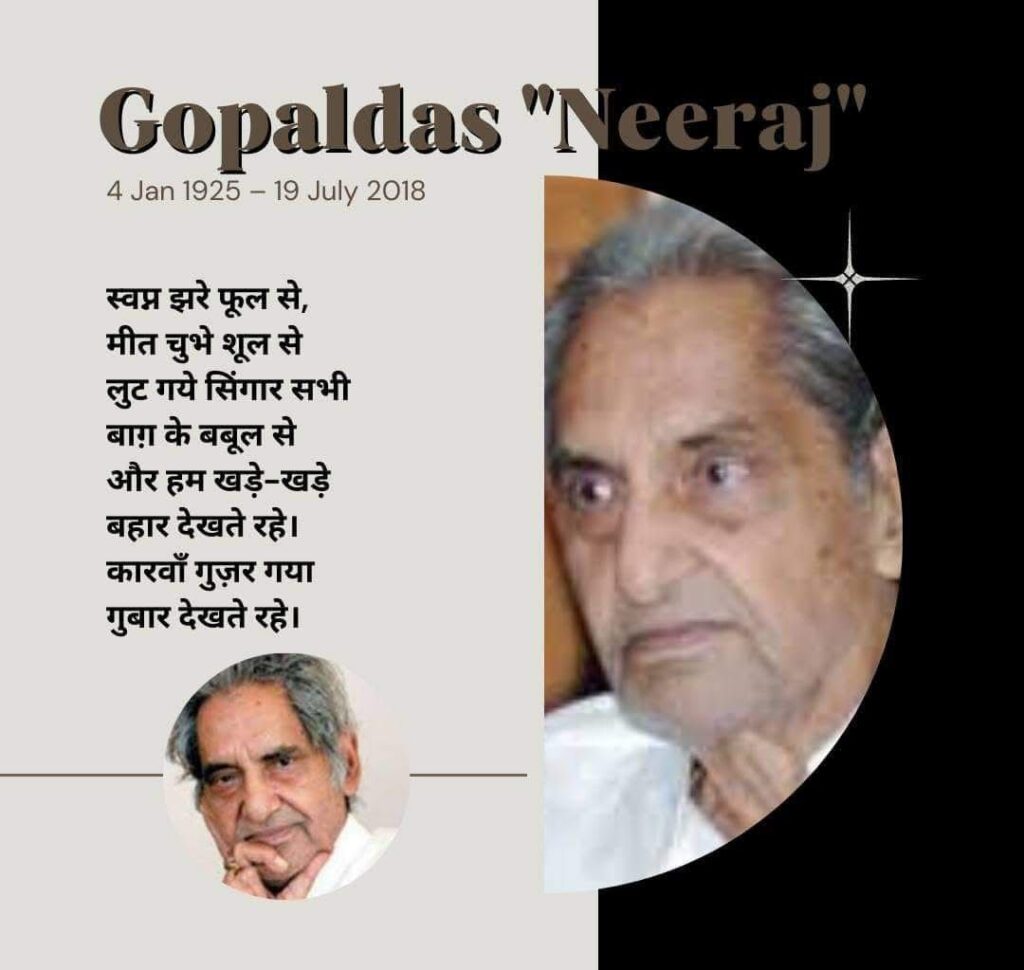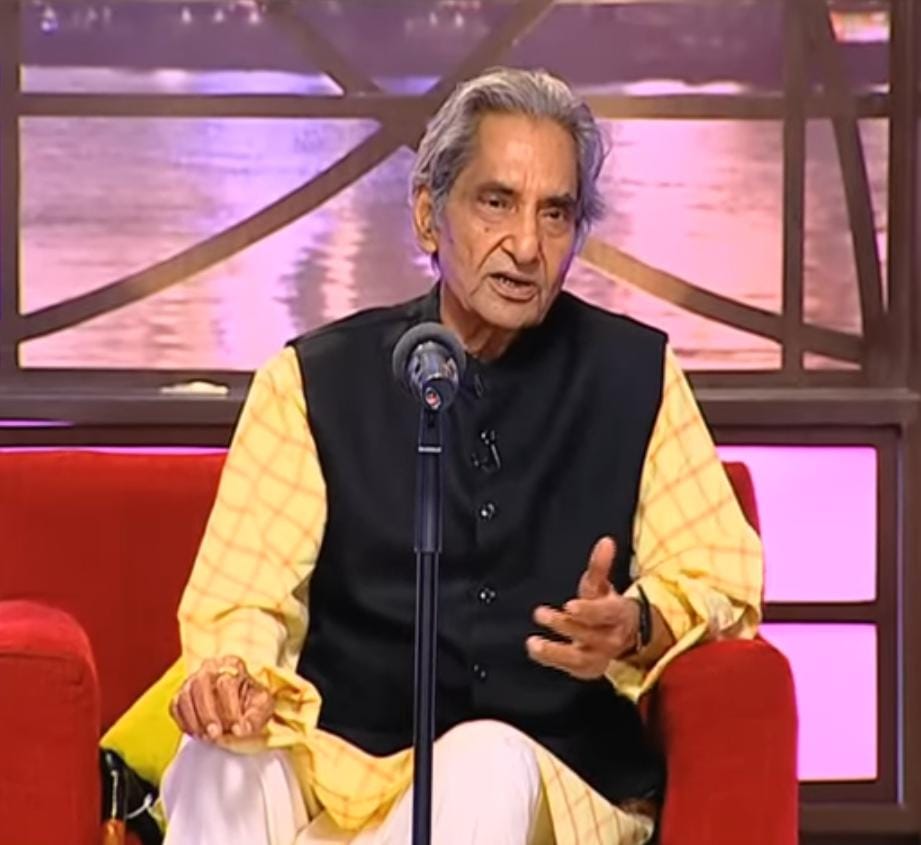

A Lyrical Legacy That Lives On: Remembering Gopal Das ‘Neeraj’ on His 7th Death Anniversary
July 19, 2025, marks the 7th anniversary of the passing of Gopal Das Saxena, fondly known as Neeraj, a poet and lyricist whose words continue to resonate in the hearts of millions.
On this solemn occasion, we pay tribute to one of modern India’s finest Hindi poets and lyricists, whose verses wove together the threads of human emotion with unparalleled grace and depth.
The Poet of the People
Gopal Das Saxena, better known by his pen name ‘Neeraj,’ was a luminary whose words transcended the boundaries of time and medium. Born on January 4, 1925, in Etawah, Uttar Pradesh, Neeraj’s journey as a poet and lyricist was shaped by a life marked by love, loss, and an unyielding passion for Hindi literature. His poetry, often born from a “broken heart, desire, and years of suffering,” as he once described, struck a chord with audiences across generations. Whether through the soulful strains of his film songs or the profound verses recited at Kavi Samelans, Neeraj had a rare gift: the ability to make listeners smile through tears.
Neeraj’s legacy is twofold—his contributions to Hindi cinema as a lyricist and his monumental presence in the literary world as a poet. His work, whether set to music or etched in the pages of poetry collections, reflects a deep understanding of the human condition, expressed in pure, unadulterated Hindi that rejected the Urdu-Hindi blend prevalent in his time. Inspired by the likes of Harivansh Rai Bachchan, Neeraj carved a niche for himself, blending simplicity with philosophical depth.
A Cinematic Maestro: Neeraj’s Film Songs
Neeraj’s foray into Hindi cinema began with Nayi Umar Ki Nayi Fasal (1965), directed by R. Chandra, who was captivated by Neeraj’s iconic poem, “Karwaan Guzar Gaya, Ghubar Dekhte Rahe.” Though the film failed to resonate with audiences, its songs became immortal, a testament to Neeraj’s lyrical genius. Lines like “Aur hum khade khade gubaar dekhte rahe” captured the fleeting nature of life, a theme that permeated much of his work. This debut marked the beginning of a remarkable career in Bollywood, where Neeraj penned songs for films like Mera Naam Joker, Prem Pujari, Sharmilee, Gambler, Tere Mere Sapne, and Pehchan, among others.
His film songs are milestones in Hindi cinema, blending poetic finesse with emotional resonance. In Prem Pujari (1970), Neeraj’s “Phoolon Ke Rang Se, Dil Ki Kalam Se” and “Shokhiyon Mein Ghola Jaye” painted vivid imagery of love and longing, set to S.D. Burman’s soulful compositions. Similarly, Sharmilee (1971) showcased his versatility with songs like “Khilte Hain Gul Yahan” and “Megha Chhaye Aadhi Raat,” which captured the delicate interplay of romance and melancholy. In Mera Naam Joker (1970), Neeraj’s “Aye Bhai Zara Dekh Ke Chalo” and “Kehta Hai Joker Sara Zamana” infused philosophical musings into the narrative of a clown’s life, earning him widespread acclaim.
Neeraj’s ability to craft lyrics that were both accessible and profound set him apart. Songs like “Mera Mann Tera Pyaasa” and “Dil Aaj Shayar Hai” from Gambler (1971) explored the poet’s inner turmoil, while “Likkhe Jo Khat Tujhe” from Kanyadaan (1968) became an anthem of youthful love. His insistence on using pure Hindi lent his songs a timeless quality, making them resonate with audiences even decades later. Each lyric was a delicate balance of rhythm, emotion, and imagery, transforming ordinary moments into poetic revelations.
A Literary Giant: Neeraj’s Poetic Oeuvre
Beyond the silver screen, Neeraj was a towering figure in Hindi literature. A master of the Geet tradition, his poems were celebrated for their lyrical beauty and emotional depth. His recitals at Kavi Sammelans were legendary, where his melodious voice and expressive delivery left audiences spellbound. Neeraj’s poetry was not confined to elite literary circles; it found its way into school textbooks, ensuring that generations of students grew up reciting his verses.
Neeraj authored over two dozen books, including collections like Antardhwani, Geet Ageet, and Nadi Ke Dweep. His poems often explored themes of love, loss, and the human struggle, yet they were imbued with hope and resilience. One of his most famous lines, “Ab to mazhab koi aisa bhi chalaya jaaye, jis mein insan ko insan banaya jaaye,” reflects his vision for a world united by humanity rather than divided by creed. This couplet, with its universal appeal, encapsulates Neeraj’s ability to distill complex ideas into simple yet profound words.
His poetry was deeply personal, often drawing from his own experiences of heartbreak and longing. Yet, it was universal in its appeal, resonating with anyone who had ever loved or lost. Neeraj’s verses were not just words on a page; they were emotions given form, capable of evoking both joy and sorrow. His style, marked by rhythmic flow and vivid imagery, made his poetry accessible yet intellectually stimulating, earning him a place among the greats of modern Hindi literature.
The Man Behind the Words
Neeraj’s life was as poetic as his work. Born into modest circumstances, he faced numerous hardships, including financial struggles and personal losses. Yet, these challenges fueled his creativity, giving his poetry and songs an authenticity that resonated deeply with audiences. His ability to transform pain into art made him a “people’s poet,” as he was fondly called. Neeraj’s recitals were not mere performances; they were emotional journeys that left audiences reflecting on their own lives.
His contributions were recognized with prestigious honors, including the Padma Shri in 1991 and the Padma Bhushan in 2007, acknowledging his immense impact on Indian literature and cinema. Neeraj’s work also earned him numerous literary awards, cementing his status as a cultural icon.
A Timeless Legacy
On July 19, 2018, Neeraj passed away at AIIMS, New Delhi, after a prolonged illness, leaving behind a void in the world of Hindi poetry and cinema. Yet, his words continue to live on, sung in homes, recited in classrooms, and cherished in hearts. His songs remain staples on radio stations and streaming platforms, while his poems continue to inspire poets and readers alike.
Neeraj’s legacy is a testament to the power of words to transcend time and touch souls. Whether it’s the haunting melancholy of “Karwaan Guzar Gaya” or the romantic exuberance of “Aaj Madhosh Hua Jaye Re,” his work captures the essence of the human experience. His insistence on pure Hindi not only preserved the language’s richness but also made it accessible to millions, proving that poetry and song could be both profound and popular.
As we commemorate Neeraj’s 7th death anniversary, we celebrate a man who gave voice to our deepest emotions. His words remind us to pause, reflect, and cherish the fleeting moments of life, much like the caravan that passes, leaving us to ponder the dust it leaves behind. In his poetry and songs, Neeraj remains immortal—a beacon of light in the world of Hindi literature and cinema, guiding us with his timeless wisdom and unparalleled artistry.
Hasnain Naqvi is a former member of the history faculty at St. Xavier’s College, Mumbai





